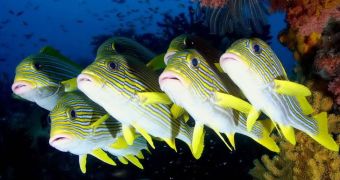Wildlife researchers have long known that noise pollution caused by boats and ships negatively affects whales, dolphins and other marine mammals. According to a new study, coral reef fish are no strangers to noise pollution-induced disorientation either.
Specialists working with the University of Bristol explain that coral reef fish and other similar species rely on underwater sounds to navigate their surroundings and figure out where they can find shelter and/or food.
Noise pollution makes it difficult for them to make head and tail of where their homes are, not to mention the fact that it can scare them into abandoning the coral reefs they would normally inhabit.
This in turn affects marine ecology as a whole, the University of Bristol researchers say.
“Natural underwater sound is used by many animals to find suitable habitat, and traffic noise is one of the most widespread pollutants. If settlement is disrupted by boat traffic, the resilience of habitats like reefs could be affected,” Sophie Holles, PhD, explains.
One other researcher, Dr. Steve Simpson, also believes that, “Boat noise may scare fish, affecting their ecology.”
The specialists warn that, on the long run, a decrease in the number of fish inhabiting coral reefs will affect fishermen and coastal communities.

 14 DAY TRIAL //
14 DAY TRIAL //